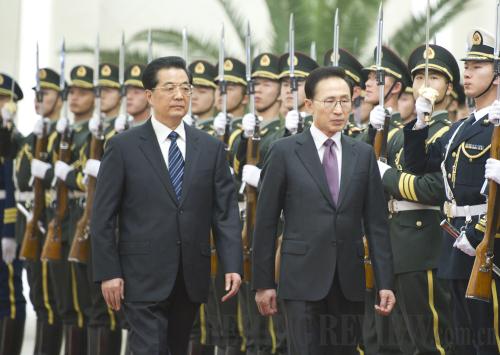|
 |
|
GUEST OF HONOR: Chinese President Hu Jintao welcomes South Korean President Lee Myung Bak for a state visit in Beijing on January 9 (HUANG JINGWEN) |
South Korean President Lee Myung Bak has wrapped up a visit to China with implications for both regional economic cooperation and for the future security of the Korean Peninsula.
Lee started his three-day state visit to China on January 9. It was the South Korean president's second state visit to China since he took office in February 2008.
Lee's visit came shortly after the leadership change in North Korea in December 2011 and months ahead of the 20th anniversary of Sino-South Korean diplomatic relations. It will probably be helpful for stabilizing the Korean Peninsula situation, while promoting mutual understanding and deepening bilateral economic and trade cooperation, analysts said.
"Face-to-face communication is necessary for Chinese and South Korean leaders, especially as North Korea experienced the unexpected leadership transition," said Liu Jiangyong, a professor with the Institute of International Studies at Tsinghua University in Beijing.
"It is important that China and South Korea have reached a consensus that the death of North Korea leader Kim Jong Il should not affect the peace and stability of the Korean Peninsula," said Shi Yinhong, a professor of international studies with Renmin University of China.
During Lee's visit, he met and had talks on the Korean Peninsula situation with Chinese President Hu Jintao. The two presidents stressed it is the shared goal of South Korea and China to realize the denuclearization of the peninsula and safeguard its stability.
At the meeting, President Hu said, "China will continue to support the improvement of relations, through dialogue, between North Korea and South Korea."
Hu said all parties concerned should be interested in safeguarding peace and stability on the Korean Peninsula. China is willing to make any effort to achieve this.
Lee said South Korea expects China to continue to play a positive role in helping maintain stability on the Korean Peninsula.
"President Hu and President Lee made good communication and coordination during their talks," said Shi Yongming, an associate research fellow with the China Institute of International Studies (CIIS). "But South Korea failed to seize the opportunity and take substantial measures to improve Seoul-Pyongyang relations following Kim Jong Il's death. It missed a good chance to promote reconciliation on the Korean Peninsula."
After the Kim Jong Il's death on December 17, 2011, the Lee administration didn't send an official condolence delegation to Pyongyang, a move that irritated North Korea. In response, North Korea suspended communications with the Lee administration.
| 